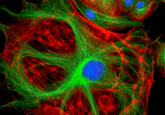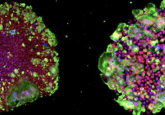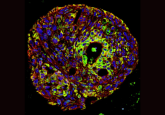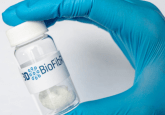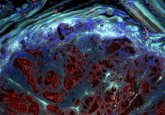Specialty reagents for production, visualisation and analysis of glycans
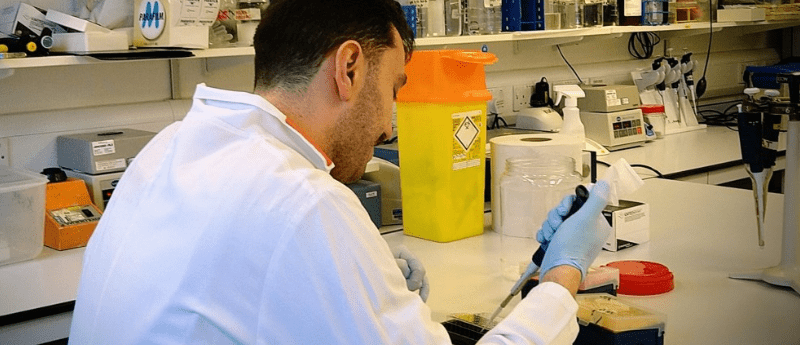
AMSBIO, (Oxford, UK) reports how the Faculty of Biological Sciences at the University of Leeds (UK) is using their specialty reagents for the production, visualization, and analysis of glycans and to investigate their interactions which are instrumental to the advance of glycobiology.
Glycobiology is vital for many biological processes — from fertilization to inflammation — helping unlock information about interactions between carbohydrates and proteins and providing the mechanism by which many viruses and bacteria latch on to healthy cells. Leading research groups around the world are using glycobiology reagents to reach a better understanding of the biology of neurons, stem cells, inflammation, infection, and cancer.
Researchers from the Richter and Kwok Laboratories in the Faculty of Biological Sciences at the University of Leeds are particularly interested in a class of polysaccharides called glycosaminoglycans, which are abundant on the cell surface and in extracellular space. They provide shape to cell surfaces and help organize extracellular matrix that forms the conduit for molecular diffusion and cell migration.
Head of the Kwok Lab – Dr Jessica Kwok commented “Glycans are the dark matter of biology. We know they are widely found outside and inside cells. We know they are important. Yet, we know all too little about how they work. One particular research focus in our labs is better understanding the molecular assembly of perineuronal nets (PNNs), a glycan-rich extracellular matrix structure on the surface of neurons.”
Continuing Dr Kwok said “As their name suggests, mature PNNs, have a reticular (net-like) morphology with holes for the formation of synapses. We have recently shown, with the help of specialty glycobiology reagents from AMSBIO, that the multivalent interactions between chondroitin sulfate glycosaminoglycans and semaphorin proteins could be a driving force behind the distinct structure of PNNs. These interactions contribute to regulating synaptic plasticity, and their better understanding and control opens up new avenues to promote synapse formation such as potential treatments for spinal cord injury or understanding aging processes.”
Research colleague and head of the Richter lab – Dr Ralf Richter added “Glycans, whether on cell surface or in the extracellular matrix, are essential for the communication of cells with their environment. Glycans modulate the lateral mobility and activity of cell surface receptors, ion channels and cytokines, and function as barriers to infection, yet many bacteria and viruses exploit our glycans for cell adhesion and entry. However, most advances in biology critically depend on the availability of bespoke reagents. This is particularly true for glycobiology and the biosynthesis of glycans where AMSBIO has established itself as a leading provider of high-quality specialty reagents for the production, visualization, and analysis of glycans which are key to our research.”
Dr William Hadlington-Booth, Glycobiology Business Unit Manager at AMSBIO said “Everything in cell biology makes much more sense in the light of glycobiology, so we are proud of our global reputation as the premier supplier for the glycobiology research community. Drawing upon over 30 years’ experience, we have established an unmatched portfolio of high-quality reagents, including unique ranges of antibodies, lectins, enzymes, assay kits and standards. We have invested in inventory to help us supply researchers with key reagents when they need them. And we are excited to see the discoveries our reagents enable.”
For further information on advanced research tools for studying glycan production, life, and structure please visit https://www.amsbio.com/research-areas/glycobiology or contact AMSBIO on +31-72-8080244 / +44-1235-828200 / +1-617-945-5033 / [email protected].
For further information about the Faculty of Biological Sciences at the University of Leeds please visit https://biologicalsciences.leeds.ac.uk/
About AMSBIO
Founded in 1987, AMS Biotechnology (AMSBIO) is recognized today as a leading transatlantic company contributing to the acceleration of discovery through the provision of cutting-edge life science technology, products and services for research and development in the medical, nutrition, cosmetics, and energy industries. AMSBIO has in-depth expertise in extracellular matrices to provide elegant solutions for studying cell motility, migration, invasion, and proliferation. This expertise in cell culture and the ECM allows AMSBIO to partner with clients in tailoring cell systems to enhance organoid and spheroid screening outcomes using a variety of 3D culture systems, including organ-on-a-chip microfluidics. For drug discovery research, AMSBIO offers assays, recombinant proteins, and cell lines. Drawing upon a huge and comprehensive biorepository, AMSBIO is widely recognized as a leading provider of high-quality tissue specimens (including custom procurement) from both human and animal tissues. The company provides unique clinical-grade products for stem cell and cell therapy applications. This includes GMP cryopreservation technology, and high-quality solutions for viral delivery (lentivirus, adenovirus, and adeno-associated virus.
